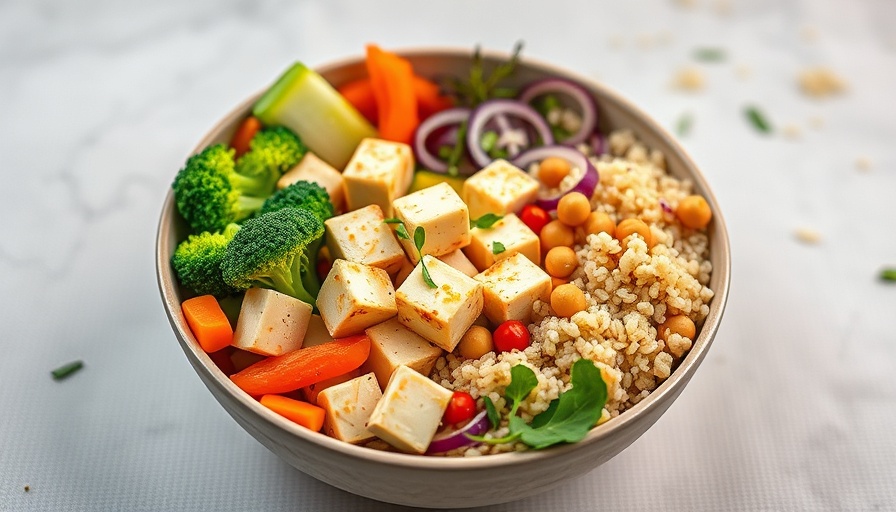
Do Plant-Based Meats Measure Up?
As more people embrace health-conscious lifestyles, the popularity of plant-based meats is soaring. Many choose these options with the belief that they offer a healthier alternative to conventional animal products. But if you're wondering whether plant-based meats are genuinely better for your health, your choice might depend on what you're comparing them to. When you weigh the benefits of plant protein against animal protein, the comparisons reveal important truths.
Exploring Health Benefits of Plant Protein
According to recent studies, individuals who consume more plant-based protein tend to share a fascinating trend: lower mortality rates. Research from Harvard’s dual cohorts studied over 100,000 individuals and found that higher intakes of animal protein were linked to greater risk of cardiovascular disease and overall mortality. In contrast, those who replaced animal proteins with plant proteins showed a decrease in these risks, underscoring the benefits of a plant-forward diet.
High protein foods derived from plants are diverse. From beans and lentils to tofu and quinoa, they provide essential amino acids vital for the body’s function. For instance, while animal protein is often regarded as a complete source, many plant protein combinations can effectively deliver all necessary amino acids when consumed together. This misconception surrounding protein quality is gradually being replaced by a more modern understanding: A varied plant-based diet using foods like beans, grains, and nuts can offer all essential nutrients.
Healthier Choices Start with Understanding
Consider what you might choose instead of a plant-based burger. A conventional burger comes laden with saturated fats and sodium, the latter linked to various health concerns such as high blood pressure. On the other hand, brands like Beyond Meat, which now uses avocado oil instead of coconut oil, have significantly improved their health profile. Still, fresh options like beans and lentils not only provide less sodium but also include beneficial nutrients like fiber and antioxidants.
How Do Plant Proteins Beat Animal Proteins?
The American Heart Association points out that decreasing meat consumption can considerably lower the risk of chronic diseases. For instance, red and processed meats are often accompanied by higher levels of saturated fat associated with inflammation — a precursor to many health problems. Meanwhile, plant proteins can promote better gut health and improved gut microbiome due to their high fiber content, which helps regulate blood sugar and aids digestion.
The Case Against Ultra-Processed Plant Foods
While many consumers enjoy plant-based alternatives, it’s crucial to avoid excessive reliance on processed varieties. Products like plant-based sausages and burgers can sometimes mirror the high sodium and saturated fat levels of their animal counterparts, especially those heavily processed. According to nutritionists, it's best to view these vegan options as fun substitutes rather than primary staples.
Why You Should Go Plant-Based (Even Partially)
Thanks to rising interest in healthful eating, many individuals report they are eating more plant foods than ever. UCLA Health notes that a plant-based diet is not an all-or-nothing approach; every incremental shift from animal to plant-based proteins can yield significant health benefits. Substituting even部分 of your meat intake with beans or lentils can elevate your diet towards improved overall health.
Nutritional Must-Haves: What to Watch For
For those considering a fully plant-based lifestyle, it is important to remain aware of key nutrients. Vitamin B12, typically found in animal products, is essential for brain function and red blood cell production. Vegetarians and vegans are advised to consider fortified options or supplements to avoid deficiency.
Overall, focusing on whole, minimally processed plant foods allows consumers to benefit from the nutritional advantages of plants while avoiding the pitfalls of highly processed meats, whether plant or animal-derived. Balancing your diet can keep meals exciting and nutritious.
Final Thoughts: Embracing Balance in Diet
The shift towards plant-based diets not only supports personal health goals but also serves as a sustainable way to care for our planet. As the U.N. has highlighted, transitioning away from heavy meat consumption can significantly lower greenhouse gas emissions and conserve water resources. For those exploring plant proteins, exploring recipes and diverse food sources can make this dietary transition both exciting and fulfilling.
Ready to Add More Plants to Your Plate?
Whether you're looking to swap out a meal for a meat-free version or take a full vegetarian plunge, incorporating more plant-based proteins into your lifestyle can work wonders for your health and well-being. To get started on this journey toward a plant-powered plate, seek out local resources or consult with a nutrition expert that can guide you on how to integrate plants healthily and deliciously.
 Add Row
Add Row  Add
Add 




 Add Row
Add Row  Add
Add 

Write A Comment